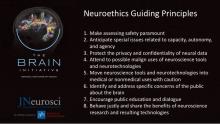
The Journal of Neuroscience recently published two commentaries on neuroethics for the NIH BRAIN Initiative: a set of eight guiding principles for neuroethical considerations in neuroscience research, as well as an accompanying commentary on neuroethics strategy and operationalization from NIH Institute Directors involved in BRAIN.
The ethical imperative surrounding the pursuit of neuroscience research, and the critical integration of neuroethics into that research, underscore the importance of considering the ethical, legal, and societal implications of scientific study. From the beginning, the NIH BRAIN Initiative has worked diligently to integrate neuroethics into its science, motivated by the understanding that brain circuit activity forms the foundation of human experiences (e.g., perception, thought, action), which is uniquely entwined with our sense of personal identity.
In recognition of the many important ethical questions related to the conduct and use of neuroscience research, NIH established the Neuroethics Working Group (NEWG), comprised of both neuroethicists and neuroscientists. This group provides expert input on neuroethics, and helps to ensure that neuroethical considerations are fully integrated into the Initiative.
To foster ongoing and engaging dialogue surrounding ethics in neuroscience research, the NEWG has published guiding neuroethical principles for the NIH BRAIN Initiative. These eight principles (see Figure below) provide an overarching framework that can help inform dialogues among stakeholders, including investigators, clinicians, institutional review boards, funders, research participants, patients, and the public, both in the design and conduct of research as they grapple with ethical questions elicited by the Initiative that call for wider discussion and deeper understanding.
For example, scientists sometimes conduct in vivo neuroscience research with patients undergoing neurosurgery for clinical indications. Several of the guiding principles help to frame ethical questions associated with this kind of research, including 1. Making assessing safety paramount; 2. Anticipating special issues related to capacity, autonomy, and agency; 3. Protecting the privacy and confidentiality of neural data; and 6. Identifying and addressing specific concerns of the public about the brain. In particular, Principle 2 presents a unique neuroethical issue – namely, how precise modulation of circuit function might affect a person’s autonomy, agency, and identity. In this research space, the neuroethics guiding principles can help researchers to navigate potentially challenging questions that arise. For more information, please view the videocast of the NEWG symposium on this topic.
Accompanying these guiding principles is a commentary from NIH Institute Directors involved in the NIH BRAIN Initiative, outlining the neuroethics strategy and operationalization of neuroethics integration into the NIH BRAIN Initiative’s research portfolio.
These guiding principles offer points of consideration, as researchers and other stakeholders navigate the difficult questions that BRAIN Initiative research will pose to society. Alongside this ongoing dialogue, a robust neuroethics infrastructure will help ensure that neuroscience research is held to the highest ethical standards for the public that it serves.
